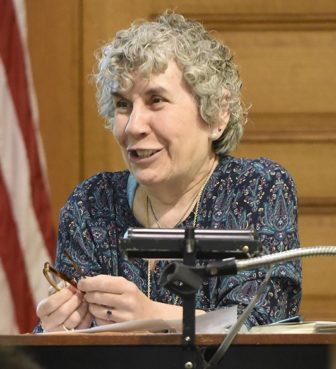“I'm learning to ‘master self’ while rising from the ashes of madness.” ―Stanley “Tookie” Williams, “Blue Rage, Black Redemption: A Memoir”
![]() The day that Stanley “Tookie” Williams was executed, I was working in the library at a juvenile court school in California. The students and I had talked this over for several months before the scheduled execution. Some of us felt a huge loss at the impending death of Tookie, as he was often called.
The day that Stanley “Tookie” Williams was executed, I was working in the library at a juvenile court school in California. The students and I had talked this over for several months before the scheduled execution. Some of us felt a huge loss at the impending death of Tookie, as he was often called.
The day after he died, the library was filled with grieving students. Many saw Tookie as a hero for making such huge changes during his prison term on death row. We had a service of sorts in the library to commemorate his life and his achievements that brought more peace to this world. Each student who wanted to speak shared something they respected about Tookie, something they learned from Tookie and something they would remember that could contribute to their own lives.
Many knew Tookie was a co-founder of the Crips and was prosecuted for the murder of four people when he was a young adult. Throughout his incarceration, the families of the victims called for his execution and were passionate advocates of pursuing the death penalty. Forgiveness was not something they could do.
Tookie's debut in street life occurred when he was 6 years old. In these early years he learned to become a predator rather than prey, as he later shared with those seeking to learn about his life. He was 17 when he met and began his journey with Raymond Washington. They formed the Crips to protect against stronger gangs in their neighborhood. In time, the Crips grew and both Tookie and Raymond took a back seat to controlling the gang as it spiraled to other locations.
Tookie was drawn to crime from an early age and witnessed immense animal abuse, which gave birth to his passion for violence and harm. Although he claimed to be innocent to the moment of his execution, his stays were denied since there was strong forensic evidence. His co-author, Barbara Becnel, is committed to proving Tookie's innocence.
His books spread anti-gang message
Tookie spent over six years in solitary for his violence directed at correctional staff and other prisoners. He used that time to transform his thinking and came back to the prison population with new ideas and a plan to contribute to preventing youth incarceration. He wrote a series of books for young children, teaching them not to head to gang lives. His book for juveniles and adults, “Life in Prison,” carried a strong message to avoid prison and, once there, to reform. This book won some very respectable awards and has been a strong ally for those wanting to build good lives.
Barbara Becnel and other dear friends of Tookie's transported his ashes to a place in Africa that had profound meaning to him. His ashes were spread in the place of his choosing to honor his ties to his ancestral African roots and to express his hopes for global gang healing.
Tookie wrote a Letter to Incarcerated Youth, and in that letter he urged all youth living within prison or juvenile jails to read, read, read. He said to read everything. Science, religion, fiction, poetry and all subjects that could help build a strong and purposeful life.
For more information on Re-entry, go to
► JJIE Resource Hub | Re-entry
“Life in Prison” was always checked out. I couldn't get enough copies to keep readers supplied. Tookie was clear. He said prison is no place to live. No place to strive for. He thought it was a great place to be in his early years and he found out the truth.
Some of the kids couldn't stop talking about Tookie ... about his early life of pain and crime, his years in solitary, his years on death row, his contributions and his execution that went very badly. Tookie endured extreme pain. I am still grieving for that terrible and catastrophic ending to a life of such struggle and then redemption.
What Tookie left behind

Jane Guttman
I can't stop talking about Tookie, either. He showed us that everyone and anyone can change from an early path of such violence and harm. Tookie went the whole way with his redemption. He arranged a peace treaty between the Bloods and Crips, he was nominated for the Nobel Peace Prize on numerous occasions, an honor that is rare for most and extremely rare for someone on death row.
Tookie also participated in a Gang Peace Summit by video from death row. He was passionate about preventing what he called “gangsterism,” the path that leads to death and pain. Before his death, Tookie received 70,000 emails, many from those who chose not to join gangs, those who left gangs, and many who thanked Tookie for saving their lives.
If you have read Tookie's books, what are some lessons you can take from his guidance? What is something about Tookie that you respect, something that you'd like to know more about? If you were to meet Tookie while he was still here with us, what would you have said or asked?
Keep Tookie's story with you as you go forward to your own life. Remember that redemption and redirection are possible for anyone and everyone. Listen only to those who support this concept. Some will say you cannot do it but you surely can. It is up to you.
Although my words follow, I am sharing them in memory of what I have heard many kids say about Tookie. In their voice:
“Gonna miss you on Earth bro,
“You were a big mentor for me.
“I didn't have no daddy either
“and my mama did her best.
“Couldn't keep me off the streets
“and couldn't get me to stay in school.
“Just like you, my school was the streets.
“Pimps and thugs and guns and death.
“You cried about Black on Black deaths.
“I get it now, all that killing in those rival gangs.
“Glad you didn't end up like Raymond
“Lost to the streets way before his time.
“And I got some tears that we lost you anyway.
“I heard you got a son
“and he doesn't have no daddy either.
“First in prison and then in ashes.
“Teacher said you were happy since
“your kid wasn't in a gang.
“Imagine about the Nobel,
“a Crips founder and death row bro.
“Even if you didn't win, you did win.
“Teacher said this was a big honor
“and was because you said goodbye to gangs.
“And wrote books about it.
“Then got a peace treaty.
“And kept telling everyone
“to leave crime behind
“and be who you can be.
“I'm gonna do it too.
“Yeah, I'm gonna do it.
“Teacher says don't wait.
“Leave the gang now.
“Gonna find out how to do
“it and still survive.
“Right now, wherever you are.
“Even locked up.
“Like Tookie.
“Teacher told us about this kid,
“wrote a poem she will never forget.
“One line is hers forever.
“‘The only way out is to die.’”
“She got busy after that poem.
“Searched out the parents.
“Asked for their help.
“And here's what happened.
“They sent him to another region
“to live with his sister
“who was a deputy sheriff.
“Hope he made it.
“The dad said he'd do anything
“to save his son.
“The sister said no gangs in her home.
“Teacher knew that kid could do it.
“Knew he could ‘master self’ like Tookie said.
“Truth is Teacher tells us we all can do it.
“I don't believe in execution.
“They call it the death penalty
“but it's really murder.
“Redemption is Tookie's story.
“He made it as right as he could
“since he couldn't change what happened.
“I can make it right, too.
“Yeah, I hurt someone.
“I can't change it.
“Nothing will erase it.
“But I am more than that crime.
“Way more.
“I wish it didn't happen.
“I can live life with some honor.
“Watch me.
“Don't wanna die like Raymond
“or be ashes like Tookie.
“I know I can do it.
“Teacher told us thousands came to the funeral.
“Reverend Jesse Jackson and some other big guys.
“Tookie, you got a lot of respect that day.
“You gotta lot of respect in here, too.
“Your ashes are spread in South Africa
“and hope you know your spirit is here,
“yeah, right here,
“in our hearts ...”
Jane Guttman is a retired correctional educator, wellness educator, emotional literacy specialist and prison life literacy advocate. Her book, “Kids in Jail: Portrait of Life Without Mercy” addresses the pain for kids and the inspiration of kids.
The Beat Within, a publication of writing and art from incarcerated youth, was founded by David Inocencio in San Francisco in 1996. Weekly writing and conversation workshops are held in California, six other states and Washington, D.C. Submissions and new partners are welcomed. Write to him at dinocencio@thebeatwithin.org.

In Alameda County Juvenile Hall we had Tookie call in from San Quentin and talk with the youth. I have a recording of this, as well as his apology. He was a great mentor for your youth.
The excellent article penned by Jane Guttman is heart warming and heart breaking. When I reflect on the Death Penalty I inevitably think of the injustice of the killing of Tookie Williams.